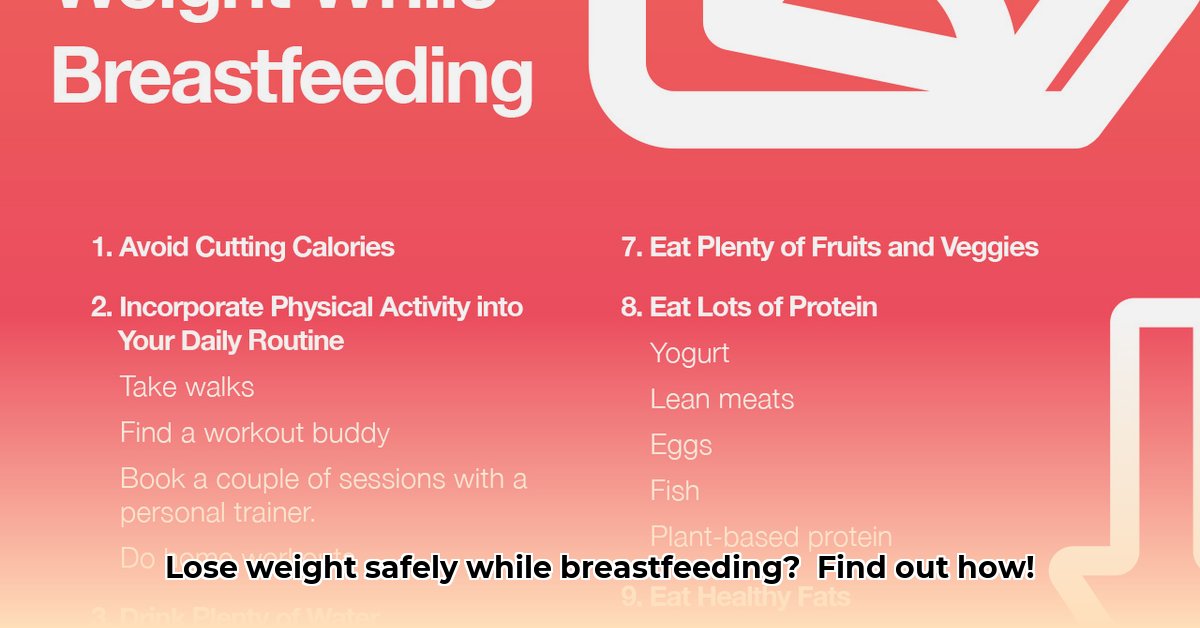
Losing weight after childbirth while breastfeeding is a personal journey requiring a nuanced approach. This guide provides a framework for safe and effective weight loss, emphasizing the importance of personalized plans and professional guidance. Remember, your health and your baby's well-being are paramount.
Understanding Your Caloric and Macronutrient Needs
Breastfeeding significantly increases your daily caloric needs. Estimates suggest an additional 300-500 calories per day, but this varies drastically based on individual factors, including activity level, pre-pregnancy weight, and baby's feeding patterns. Why is this extra energy needed? It fuels milk production and supports your body's recovery. Crucially, guesstimating your caloric needs is highly discouraged.
This increased caloric requirement highlights the importance of consuming sufficient macronutrients:
Protein: Essential for milk production, tissue repair, and overall health. Adequate intake is vital for both you and your baby. (Consult your doctor or dietitian to determine your specific needs).
Healthy Fats: Critical for your baby's brain development and your hormonal balance. Focus on sources like avocados, nuts, seeds, and olive oil. (These provide sustained energy and support various bodily functions.)
Carbohydrates: Your body's primary energy source. Opt for complex carbohydrates (whole grains, fruits, vegetables) over refined sugars for sustained energy and fiber. (Avoid energy crashes associated with simple sugars.)
There's no universally optimal macro ratio for breastfeeding mothers aiming to lose weight. The ideal balance depends on individual factors.
Crafting Your Personalized Weight Loss Plan: A Step-by-Step Guide
Consult a Healthcare Professional: This is the first and most crucial step. Schedule consultations with your obstetrician/gynecologist and a registered dietitian (RD). They'll assess your health, discuss your goals, and ensure your weight loss plan is safe for both you and your baby. "A personalized approach is paramount to ensure both maternal and infant well-being," states Dr. Anya Sharma, MD, OB/GYN at [Hospital Name].
Estimate Caloric Needs (Cautiously): Online calculators can offer a starting point, but their estimations lack the nuance of individual factors. Use them only as a rough guide, and adjust based on your healthcare provider's recommendations.
Determine Macronutrient Targets (with Expert Guidance): Your RD will work with you to determine the ideal macro ratios for your specific needs, goals, and breastfeeding status. They'll emphasize whole, unprocessed foods over rigid numerical targets. "Focusing on nutrient density over strict macro ratios often leads to better long-term adherence and overall well-being," explains registered dietitian Sarah Miller, RDN, from [Nutrition Clinic Name].
Track Progress (Safely): Monitor your weight and other relevant health metrics, but avoid obsessive tracking. Focus on how you feel – energy levels, milk supply, overall health are key indicators of success. Significant weight loss should always be carefully managed under medical supervision.
Sample Meal Plans (Adapt to Your Needs!)
These are illustrative examples only and should be adapted to fit your individual needs and preferences. Your RD can provide personalized meal plans based on your goals and caloric target.
- Breakfast: Greek yogurt with berries and nuts, oatmeal with fruit and chia seeds, whole-wheat toast with avocado.
- Lunch: Large salad with grilled chicken or fish, lentil soup with whole-grain bread, quinoa bowl with vegetables and lean protein.
- Dinner: Baked salmon with roasted vegetables, chicken stir-fry with brown rice, lean ground beef with sweet potato and broccoli.
Addressing Common Concerns
- Maintaining Milk Supply: Consistent hydration and adequate nutrition are crucial. Severe calorie restriction can negatively impact milk production. Any concerns should be addressed with your healthcare provider.
- Managing Hunger: Frequent, smaller meals and nutrient-rich snacks help prevent extreme hunger and maintain stable energy levels. "Small, frequent meals prevent extreme hunger and maintain energy, which is vital for breastfeeding mothers," notes nutritionist Jessica Davis, MS, RDN from [Wellness Center Name].
- Dealing with Cravings: Satisfy cravings occasionally with healthier alternatives. A small piece of dark chocolate might be a better option than processed sweets.
Conclusion
Safe and effective weight loss during breastfeeding requires a holistic, personalized approach. Prioritize consultation with your doctor and an RD, focus on nutrient-rich foods, and remember that gradual progress is more sustainable than rapid weight loss. Prioritize your well-being and that of your baby above all else. This is a journey about nourishing both yourself and your child.